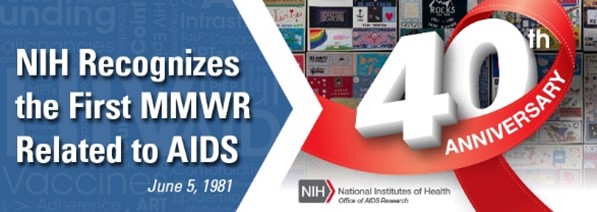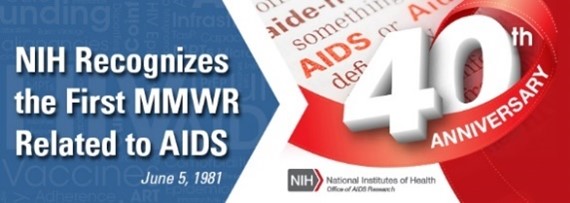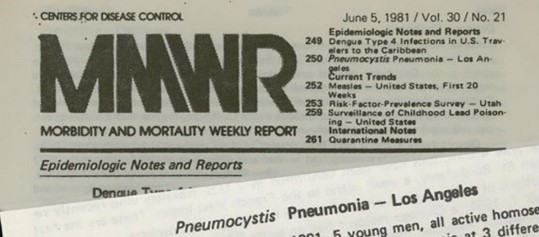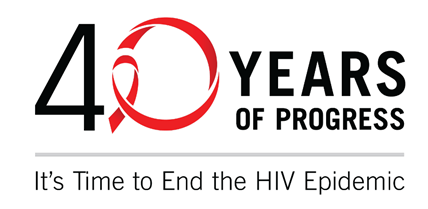NIH OAR MMWR 40th Anniversary Social Media Toolkit
Campaign: NIH Recognizes the First MMWR Related to AIDS, June 5, 1981
May 1–December 1, 2021
Overview: It has been 40 years since the landmark 1981 CDC Morbidity and Mortality Weekly Report (MMWR) was published – a report that first recognized the syndrome of diseases later named AIDS. June 5th also marks HIV Long-term Survivors Awareness Day.
The scientific community did not know at the time exactly what the observations meant, nor that the human immunodeficiency virus (HIV)/acquired immunodeficiency syndrome (AIDS) pandemic was underway. In retrospect, the responses by leaders were staggering and a tribute to what we can achieve together.
NIH investment in HIV research has produced nearly 40 years of groundbreaking discoveries and innovation. Through a multi-disciplinary, comprehensive, and increasingly integrated research approach, NIH research products contribute to the implementation of prevention, care, and treatment interventions that match the needs of a given community — and are delivered at the scale needed to achieve the goals of the research priorities.
POC:
Dr. Yvette Edghill Spano
Senior Advisor, Communications, Legislative Policy, and Planning
Office of AIDS Research, NIH
[email protected]
- #OAR stands with the scientific community to call attention to the first official reporting that led to the recognition of acquired immunodeficiency syndrome (#AIDS). https://bit.ly/3aJaX4o #40YearsOfHIV
- This year the #NIH commemorates the 40th anniversary of the first MMWR related to acquired immunodeficiency syndrome (AIDS). https://bit.ly/3aJaX4o #40YearsOfHIV
- June 5, also #HIV Long-term Survivors Day, marks 40 years since CDC’s MMWR published a report of Pneumocystis carinii pneumonia (PCP) in immunocompromised persons. Epidemiologists were able to eventually identify the major risks factors for what would later become known as #AIDS. #40YearsOfHIV #HLTSAD
- This year the #NIH commemorates the 40th anniversary since CDC's MMWR first recognized the syndrome of diseases later named #AIDS on June 5th, also #HIV Long-term Survivors Day. #40YearsOfHIV #HLTSAD
- Since the 1981 MMWR, the NIH HIV Research Agenda continues to be strategic, nimble, and balanced in its priorities while continuing to pursue the most salient challenges and opportunities of the 21st Century.
- NIH investment in HIV research has produced nearly 40 years of groundbreaking discoveries and innovation. #40YearsOfHIV
- The scientific characterization of HIV and the determination of the variants of the virus around the world and within individual patients provided scientists essential details to develop life-saving treatments.
- To commemorate the MMWR 40th anniversary, the U.S. government is coordinating events and activities across federal agencies and working together with non-federal partners to end the #HIV epidemic focusing on four key themes – Reflect, Recommit, Reenergize, Reengage. #40YearsOfHIV
- NIH commemorates the 40th anniversary of the first MMWR related to the acquired immunodeficiency syndrome (AIDS), #HIV Long-term Survivors Day. It has been 40 years since the June 5, 1981 CDC Morbidity and Mortality Weekly Report that first recognized the syndrome of diseases later named AIDS. The scientific community did not know at the time exactly what the observations meant, nor that the human immunodeficiency virus (HIV)/AIDS pandemic was underway. This year stand with the scientific community to call attention to the observations that led to the recognition of AIDS. June 5 is also #HIV Long-term Survivors Day. #40YearsOfHIV
- Since acquired immunodeficiency syndrome (AIDS) was first officially reported in 1981, the NIH HIV Research Agenda has evolved, but continues to be strategic, nimble, and balanced in its priorities ─ keeping the cure research pipeline open, while continuing to pursue the most salient challenges and opportunities of the 21st Century. #40YearsOfHIV
- NIH investment in HIV research has produced almost 40 years of groundbreaking discoveries and innovation. Through a multi-disciplinary, comprehensive, and increasingly integrated research approach, NIH research products contribute to the implementation of prevention, care, and treatment interventions that match the needs of a given community — and are delivered at the scale needed to achieve the goals of the research priorities. #40YearsOfHIV
- To commemorate the MMWR 40th anniversary, the U.S. government is coordinating events and activities across federal agencies and working together with non-federal partners to end the #HIV epidemic focusing on four key themes – Reflect, Recommit, Reenergize, Reengage. #40YearsOfHIV
- The National Institutes of Health (NIH), a part of the U.S. Department of Health and Human Services, is the nation’s medical research agency — making important discoveries that improve health and save lives, commemorates the 40th anniversary of the first official reporting of what will later become known as the acquired immunodeficiency syndrome (AIDS) epidemic. Read a statement from the Office of AIDS Research (OAR), which coordinates the scientific, budgetary, legislative, and policy components of the NIH HIV/AIDS research agenda, that highlights the NIH’s contributions to the human immunodeficiency virus (HIV)/AIDS response since the June 5, 1981 CDC Morbidity and Mortality Weekly Report first recognized the syndrome of diseases later named AIDS. The scientific community did not know at the time exactly what the observations meant, nor that the HIV/AIDS pandemic was underway. In retrospect, the responses by leaders were staggering and a tribute to what we can achieve together. #40YearsOfHIV
Images



Additional items from HIV.gov and CDC.gov
 40 Years of Progress – It’s Time to End the HIV Epidemic
40 Years of Progress – It’s Time to End the HIV Epidemic
This June 5th, the world will mark 40 years since the first five cases of what later became known as AIDS were officially reported. The U.S. Centers for Disease Control and Prevention’s (CDC) Morbidity and Mortality Weekly Report (MMWR) described the five cases. This momentous occasion is also observed as HIV Long-Term Survivors Day. From June 8–10, the United Nations (UN) High-Level Meeting (HLM) on HIV and AIDS will occur, where the UN General Assembly will review the progress made in reducing the impact of HIV since the 2016 HLM and is expected to adopt a new political declaration to guide the future direction of the HIV response around the world.
On this 40th anniversary, the U.S. government is honoring the more than 32 million people, including 700,000 in the U.S., who have died from AIDS-related illnesses globally since the start of the epidemic; redoubling efforts to ensure equitable access to services for the 38 million people with HIV, including those who are disproportionately affected; working to prevent new infections; recognizing American leadership, unity, and compassion in the HIV response; and recommitting to the goal of ending the epidemic across the U.S. and around the globe.
The U.S. is recognized for its longstanding HIV leadership and contributions at home and abroad, including through the Ending the HIV Epidemic in the U.S. initiative (EHE), the U.S. President’s Emergency Plan for AIDS Relief (PEPFAR), and substantial investments in HIV-related research. Strong, bipartisan American political leadership has joined inspired efforts by scientists, advocates, community-based organizations, health care professionals, private sector companies, people with HIV and their communities, and many others to achieve progress against HIV—including saving millions of lives, preventing millions of infections, and strengthening the response to other health threats. The adaptability and lessons learned through our four-decade journey in HIV prevention, care, and treatment laid the foundation for our continued collaborative effort to combat the COVID-19 pandemic and to reach the ultimate goal of ending the HIV epidemic in the U.S. and around the world.
To commemorate the 40th anniversary, the U.S. government is coordinating events and activities across federal agencies and working together with non-federal partners to end the HIV epidemic focusing on the Four for Forty themes: 1) Reflect, 2) Recommit, 3) Reenergize, and 4) Reengage.
Top Messages
- Reflect: We honor the more than 32 million people who have died from acquired immunodeficiency syndrome (AIDS) -related illness globally, including 700,000 in the U.S., since the start of the HIV epidemic. In their memory, we will not stop until we end the HIV epidemic in the U.S. and around the globe.
- Recommit: The U.S. government is fully committed to continued work with a diverse group of partners to help end the HIV epidemic at home and abroad, especially in communities of people with and at risk for HIV, while ensuring an effective response to COVID-19 and preparing for future pandemics. To this end, the Biden administration has proposed increased investments in global and domestic health programs, including those addressing HIV.
- Reenergize: Forty years into the HIV epidemic, we need to reenergize a whole-of-society mobilization effort in order to end it. This requires reinvigorating and diversifying the HIV response to ensure equitable access to prevention, care, and treatment services, especially for those disproportionately affected by the HIV epidemic. This effort is only possible by engaging people with lived experience and elevating their efforts to energize the community. We have made remarkable progress in preventing and treating HIV in the U.S. and around the world and our work is not finished. Stigma remains a significant barrier and the COVID-19 pandemic has slowed and threatened hard-won gains.
- Reengage: The U.S. government cannot end the HIV epidemic alone. We need continued contributions and innovation from all sectors of American and global society. Together we must reengage, continue to empower, and strengthen coordination with our partners across the U.S. and around the world for maximum and enduring impact.
Events
The federal government hosted a variety of events to commemorate the 40th anniversary of HIV to support events throughout the community.
- Reflections on 40 Years of AIDS – CDC Virtual Museum:
- Live with Leadership
- To commemorate June 5th, federal agencies are holding a series of Live with Leadership sessions hosted by Harold Phillips, Chief Operating Officer for Ending the HIV Epidemic in the U.S., to reflect upon and honor the anniversary. The sessions include:
- Community Dialogue: June 5th & Long-Term Survivors, Saturday, June 5 at 2:00 pm ET
- 40 Years of HIV: Federal Leadership, Thursday, June 17 at 1:00 pm ET
- 40 Years of Progress: HIV Testing, Tuesday, June 22 at 4:00 pm ET
- To commemorate June 5th, federal agencies are holding a series of Live with Leadership sessions hosted by Harold Phillips, Chief Operating Officer for Ending the HIV Epidemic in the U.S., to reflect upon and honor the anniversary. The sessions include:
- Partner Events
- 40 Years of Progress – It’s Time to End the HIV Epidemic: National Webinar – June 1 at 12:00 pm – 3:30 pm. Prevention through Active Engagement staff and community stakeholders will discuss how to leverage best practices, innovations, and health equity to end the U.S. HIV epidemic.
This page last reviewed on January 9, 2026

